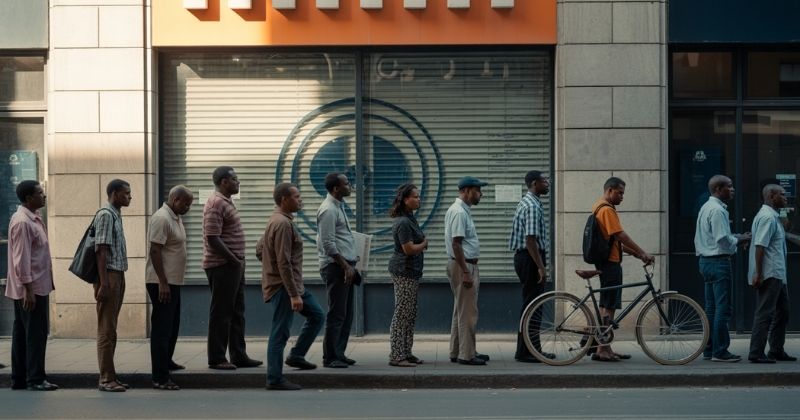
Finance Minister Enoch Godongwana has introduced a revised approach to the Social Relief of Distress (SRD) grant, with a renewed focus on aligning the grant with employment prospects for recipients. The revamped framework aims to transition beneficiaries from financial relief to sustainable income through job-seeking support and labour market integration. This marks a pivotal policy shift, suggesting that government intends to reshape the role of social grants from passive assistance to active economic inclusion.
Key Takeaways
- SRD Grant Extended with Employment Focus: The Social Relief of Distress (SRD) grant has been extended to March 2026, with a new emphasis on linking recipients to employment opportunities and potential labour market programmes.
- No Basic Income Grant Yet, but Reform Underway: Although a permanent Basic Income Grant was not introduced, the government is reviewing ways to align income support with economic participation, including proposals for a job-seeker allowance.
- Social Grant Adjustments and Budget Constraints: While selected grants will increase slightly from April 2025, planned inflation-linked increases for future years have been cancelled to save R6.6 billion, sparking concerns over the real value of grant support.
About Arcadia Finance
Arcadia Finance makes borrowing simple. Apply with zero fees and choose from 19 trusted, NCR-compliant lenders. Fast, secure, and tailored to you.
Budget 3.0 Gains GNU Backing Following Two Unsuccessful Attempts
After two previously unsuccessful attempts to table the national Budget, Minister Godongwana presented what has been dubbed “Budget 3.0” to Parliament. This version received endorsement from members of the Government of National Unity (GNU), enabling the administration to move forward with its economic and fiscal policy plans. The latest version of the Budget was seen as a critical test of unity and cooperation within the GNU, with heightened political pressure to avoid yet another deadlock.
SRD Grant Receives Further Extension with Strategic Adjustments
As a key highlight of the new Budget, the Finance Minister confirmed that the SRD grant, which was initially rolled out during the height of the COVID-19 pandemic, will once again be extended, this time until the end of March 2026. Originally valued at R350 per month, the grant amount was increased to R370, reflecting marginal adjustments to account for inflation and rising living costs. This extension is a clear acknowledgement that economic recovery remains sluggish for millions of South Africans who still rely on this monthly assistance to meet basic needs.
Origins of the SRD Grant and Its Role Beyond Temporary Relief
First introduced as an emergency measure during the public health and economic crisis of the pandemic, the SRD grant has since evolved into a more permanent component of the social support structure. Although designed to be a temporary intervention, it has been repeatedly extended by the government and is now widely regarded as a foundational element for a potential Basic Income Grant in future. Its continued existence underscores how entrenched social distress has become across the country, highlighting systemic unemployment and inequality.

No Basic Income Grant Yet, But Stronger Focus on Economic Integration
While the Budget speech did not include the introduction of a permanent Basic Income Grant, the Minister did indicate that efforts are underway to integrate the SRD system more effectively with employment-oriented initiatives. These include the possibility of introducing a job-seeker allowance and reassessing existing Active Labour Market Programmes to better support economic participation among the unemployed. This could lay the groundwork for a larger overhaul of social assistance schemes, tying income support directly to labour market outcomes.
Government’s stated objective is now dual-pronged: to continue providing financial assistance to vulnerable groups while simultaneously laying the groundwork for job creation and income independence. The broader aim is to support citizens in gaining meaningful employment and long-term financial security, rather than remaining dependent on grants. There is growing concern, however, about whether the job market is prepared to absorb the large number of SRD recipients once transition mechanisms are rolled out.
One of the cornerstones of family support in South Africa is the child support grant, designed to ease financial pressure on caregivers. Learn about the eligibility thresholds, application process, and monthly payment structure that helps many low-income households stay afloat.
Social Grant Increases for 2025/26 to Remain in Place
Regarding other social support measures, the Finance Minister clarified that the R1.6 billion in increased allocations for social grants announced in the previous budget will remain unchanged for the 2025/26 fiscal year. These funds had already been earmarked to support vulnerable populations, including pensioners, persons with disabilities, and children. This decision to retain the increase provides short-term stability, but may face criticism from advocacy groups pushing for deeper increases in line with inflation and living costs.
Although earlier planning included further inflation-beating increases for social grants in subsequent years, these proposals have now been withdrawn. The removal of these projected increases for the later years is expected to generate public savings amounting to R6.6 billion over a three-year period, as the government reassesses fiscal pressures and expenditure limits. This rollback is likely to spark debate, especially as inflation continues to impact food, transport, and healthcare costs, disproportionately affecting the poor.

Breakdown of Updated Grant Values for 2025/26
For the upcoming financial year, the government has allocated a total of R284.8 billion for social grant disbursements. This funding allows for the following monthly increases to the various grant types:
| Grant Type | Monthly Increase |
|---|---|
| Old Age Grant | R130 |
| War Veterans Grant | R130 |
| Disability Grant | R130 |
| Foster Care Grant | R70 |
| Care Dependency Grant | R130 |
| Child Support Grant | R30 |
| Grant-in-Aid | R30 |
Despite these increases, critics argue they are modest when compared to the real cost of living, and may not substantially improve the quality of life for recipients.
SRD Grant Funding Secured Through March 2026
To ensure the continued rollout of the SRD grant, the government has allocated R35.2 billion for the extended period ending in March 2026. This allocation is intended to maintain the current grant value of R370 per month for each qualifying recipient, and it includes costs associated with programme administration and distribution. With roughly 8.5 million people currently receiving the SRD grant, this budget allocation reaffirms the scale of dependency and the urgent need for parallel economic development strategies.
While social grants evolve to meet modern challenges, many older benefits remain unclaimed. Explore How to Claim Your Share of R89 Billion in Unclaimed South African Benefits and avoid leaving your share behind as systems change.
Conclusion
The 2025/26 Budget signals a shift in South Africa’s social assistance strategy, with the SRD grant evolving from temporary relief into a tool for economic integration. While ongoing support for millions of vulnerable citizens has been confirmed, government is now focusing on linking grants to employment pathways, aiming to reduce long-term dependency. However, with no Basic Income Grant introduced and inflation-linked increases scrapped for later years, questions remain about the adequacy of these grants in shielding low-income households from economic hardship.
Fast, uncomplicated, and trustworthy loan comparisons
At Arcadia Finance, you can compare loan offers from multiple lenders with no obligation and free of charge. Get a clear overview of your options and choose the best deal for you.
Fill out our form today to easily compare interest rates from 19 banks and find the right loan for you.


